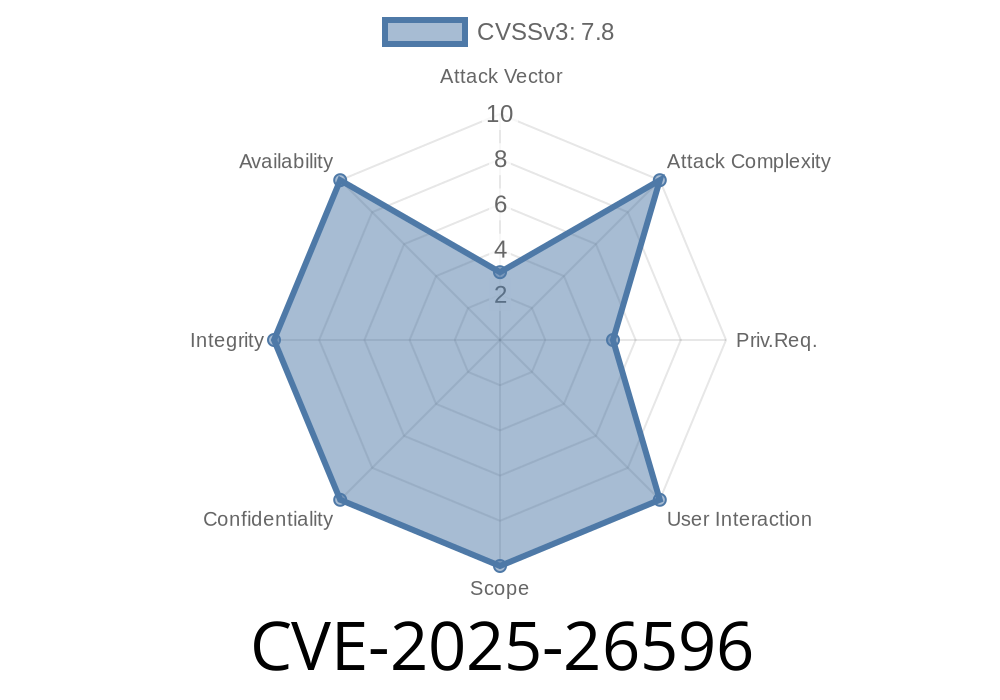A new high-profile vulnerability—CVE-2025-26596—was discovered in the X.Org Server and XWayland, thanks to a critical logic mismatch in how key symbol data is handled. This heap-based buffer overflow not only threatens the stability of systems running X.Org but also opens the door to local privilege escalation.
Let’s break down what this flaw means, how it can be exploited, and what you should do to stay safe.
What Is CVE-2025-26596?
This vulnerability lives in the Xkb (X Keyboard Extension) code inside X.Org and XWayland, which form the backbone of graphical environments on most Linux desktops.
The problem:
When the system figures out how much memory to allocate for keyboard symbols in XkbSizeKeySyms(), it uses different logic than what is used in XkbWriteKeySyms()—the function that actually writes the data. If an attacker convinces the server to process tricky, crafted keyboard data, XkbWriteKeySyms() can overwrite memory, leading to a heap overflow.
Local privilege escalation
As X.Org often runs with elevated privileges (sometimes as setuid root), exploiting this flaw can be devastating.
Key functions involved
- XkbSizeKeySyms() — Computes space needed for keysyms
- XkbWriteKeySyms() — Writes keysyms into the buffer
The bug:
XkbSizeKeySyms() allocates a buffer size based on one calculation, but XkbWriteKeySyms() writes keysyms based on a different calculation. If an attacker supplies a keyboard map with carefully chosen width and varying map_count or keysyms, the writing can spill past the buffer.
Simplified pseudo-code
// Allocation (in XkbSizeKeySyms)
int size = num_keys * max_width * sizeof(KEYSYM);
buffer = malloc(size);
// Writing (in XkbWriteKeySyms)
for (i = ; i < num_keys; i++) {
for (j = ; j < key[i].width; j++) {
buffer[offset++] = key[i].syms[j];
}
}
If any key[i].width is greater than max_width, the writing loop will overflow the allocated buffer.
Basic Exploitation Idea
A local attacker (with access to create a custom keyboard map or trigger XKB code) crafts a payload like:
Heap memory after the buffer gets overwritten with attacker-controlled data
Depending on the environment, this can lead to control over heap metadata, and possibly execute custom code.
Example Exploit Snippet (for researchers only)
Note:
Only attempt this on your own test environment!
// Pseudo-example (not a real exploit!)
// Suppose the X server is started with your test config
#include <stdio.h>
#include <stdlib.h>
#include <string.h>
int main() {
// Simulate a crafted keymap with malicious widths
int num_keys = 2;
int declared_max_width = 1;
int actual_widths[] = {4, 8}; // much bigger than max_width
// Buffer allocated with only space for 2*1=2 elements
int *buffer = malloc(num_keys * declared_max_width * sizeof(int));
if (!buffer) exit(1);
int offset = ;
// Attacker-controlled loop (writes beyond allocated buffer)
for (int i = ; i < num_keys; ++i) {
for (int j = ; j < actual_widths[i]; ++j) {
buffer[offset++] = xdeadbeef; // Malicious data
}
}
printf("Buffer overflowed!\n");
// System now unsafe!
free(buffer);
return ;
}
In real-world use, the payload is much more complex but follows the same principle.
References & Original Sources
- X.Org security advisory
- Freedesktop.org xserver Xkb code
- CVE Details for CVE-2025-26596
What Can You Do?
- Update X.Org/XWayland:
Conclusion
CVE-2025-26596 is a great reminder that even “boring” parts of the system (like keyboard code) can hide critical bugs. If you run a Linux graphical environment, patch your system now. For researchers, the logic mismatch showcased here demonstrates why even simple math in system software matters — and how attackers can take advantage.
Timeline
Published on: 02/25/2025 16:15:38 UTC
Last modified on: 03/21/2025 17:50:38 UTC
